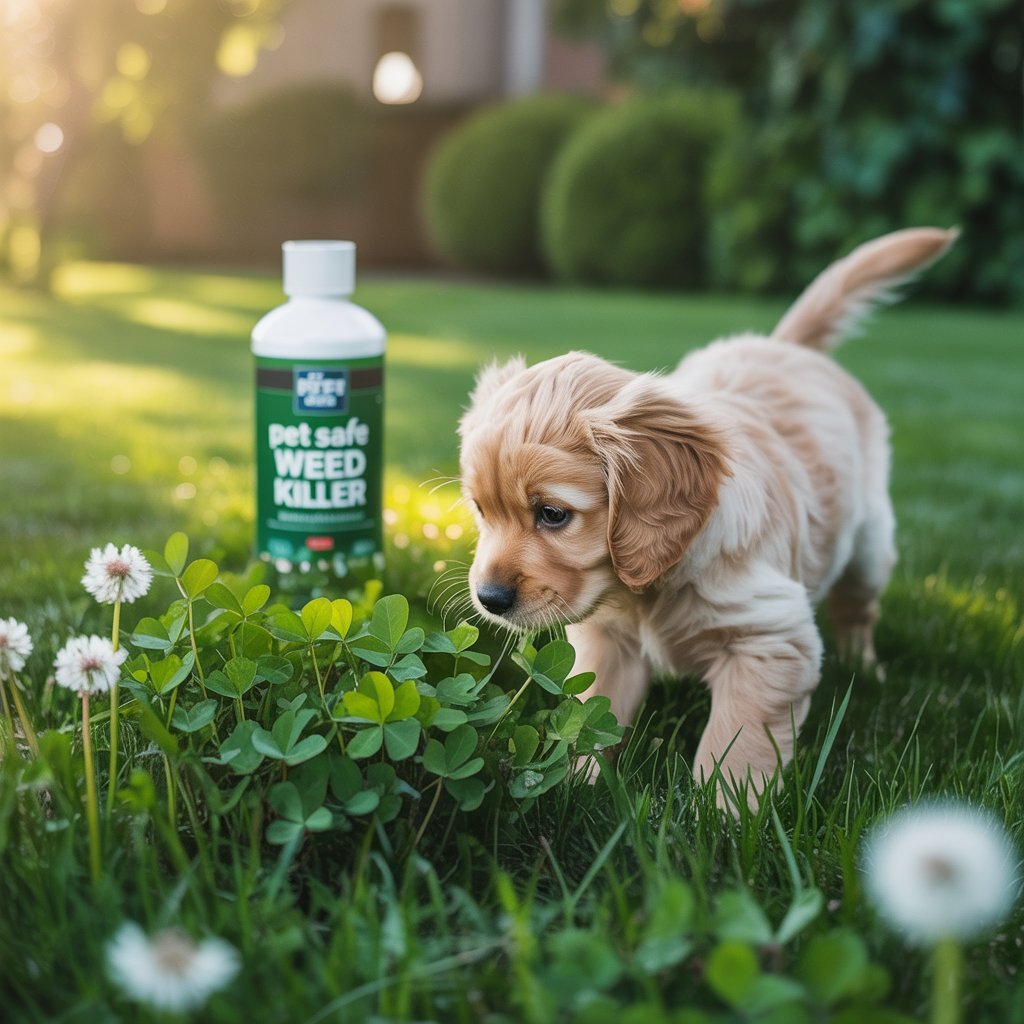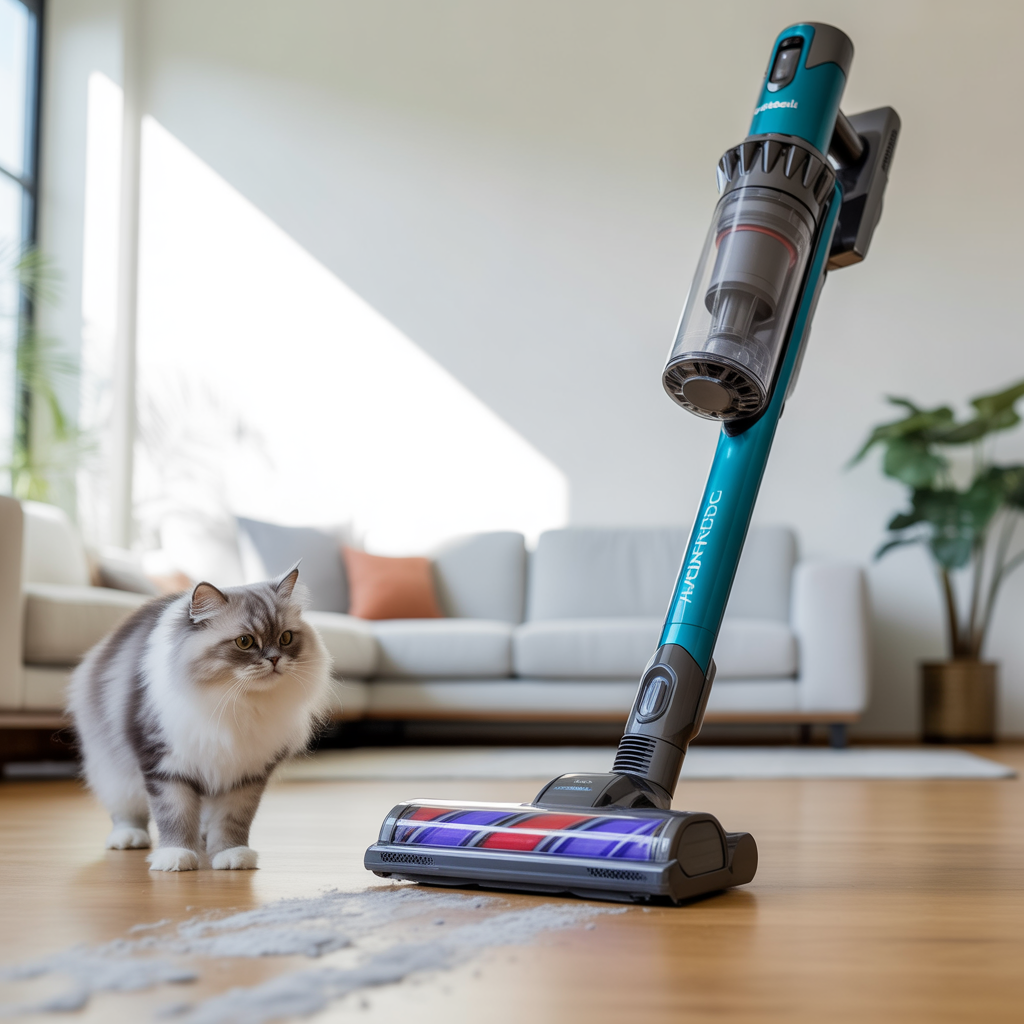Are you one of those pet parents who has a luscious, verdant yard but worries about something concerning your furry friends? Worry not; you are not alone. Most of the conventional weed killers contain chemicals such as glyphosate or 2,4-D, which can easily kill a dog, cat, or other kinds of pets. Regular symptomatic exposures of pets to chemical herbicides can cause definite skin irritations due to changes in the gastrointestinal tract and some functional changes in internal organs that present long-term risks to global health. Thus weed killers should also be selected on safety to pets and a healthy home environment.
So what is really the meaning of “pet safe”? Are organic products safe for pets as well? And how can one efficiently get rid of weeds while protecting their beloved pets? In this exhaustive guide, we will cover everything you need to know about pet-friendly weed killers, including:
What makes a weed killer safe for pets?
- Top rated pet safe weed killer recommendations.
- Homemade options you can prepare yourself.
- Applying tips for safety.
- Mistakes that pet owners must try to avoid.
What Makes a Weed Killer Pet Safe?
The most important aspect of searching for a pet-friendly herbicide is to check its contents and safety standards. People often assume that a weed killer is “natural” or “organic” and does not have poisonous ingredients that may irritate the skin or disturb the stomach of pets when ingested. But then, what exactly makes the patented weed killers pet-safe in the matter?
1. Free of Harmful Chemicals
The greatest concern would be the absence of any chemicals known to be harmful toward pets. Avoid anything containing:
- Glyphosate – Tied to possible digestive disorders and maybe even cancer in dogs.
- 2,4-D – Paints an entirely different picture: Vomiting, diarrhea, and other signs that run a neurological threat to pets.
- Diquat – Would be acutely toxic if ingested or taken up through the skin.
2. Natural Ingredients
Pet-safe products are characterized by naturally biodegradable ingredients along the lines of:
- Vinegar (Acetic Acid) – Working by burning weeds at the root.
- Citrus Oils (D-limonene) – Destroying the cell walls of weeds.
- Salt (Sodium Chloride) – To desiccate and kill undesired plants.
- Corn Gluten Meal – The aim is to stop weed seeds from germinating.
These substances present relatively low danger to pets and the environment compared to providing products with synthetic chemicals.
3. Quick Breakdown
Get a pet-safe weed killer that breaks down quite rapidly in the treatment area so it does not accumulate on the grass, soil, or any surface the pets walk or play. In an ideal world, pets should be back in the treated area with a few hours (or immediately with a few natural option
4. Certified by the EPA and Organic Seal
Look for seals indicating:
- OMRI Listed (Organic Materials Review Institute)
- EPA Safer Choice Label
- Certified Organic products are equally certified safe for both humans and animals.
5. Clear Safety Instructions
Natural or otherwise, every weed killer need safe application. Its directions should provide:
Dry time
- Recommended preventive measures
- Safe re-entry period for pets
Top Safe Pet Weed Killer Products on the Market (with Pros & Cons)
Finding the best safe pet weed killer is quite complicated because thousands of companies sell their products under the guise of being “natural” or “safe”. We did most of the work for you by gathering some credible products that pet owners often use with their good sides and bad sides.
1. Green Gobbler Vinegar Weed & Grass Killer
Ultimate Ingredient: 20% Acetic Acid (vinegar)
Pros:
- OMRI certified for organic use.
- Works within hours of application.
- No harmful residues are left thus safe for pets once it dries.
Cons:
- Strong smell of vinegar.
- It is better for small areas; not for large lawns.
2. EcoSMART Organic Weed & Grass Killer
Main Ingredients: Clove oil , vinegar
Pros:
- It is a plant based formula.
- It is biodegradable and very safe to pets.
- Nice natural scent.
Cons:
- To deep-rooted weeds, ineffective.
- Has to be reapplied more times.
3. Doctor Kirchner Natural Weed Killer
Main Ingredients: Ocean water, vinegar, soap
Pros:
- Non-selective, affecting most types of weeds.
- 24-hour fast results.
- Immediate safety for pets after use.
Cons:
- Sprays accidentally can damage other plants nearby.
- Costs more compared to others.
4. Espoma Organic Weed Preventer
Main Ingredient: Corn Gluten Meal
Pros:
- Naturally prevents the growth of weeds.
- Doubles as fertilizer for lawns.
- It is safe to kids and pets.
Cons:
- This is a pre-emergent herbicide not kill existing weeds.
- It should apply before the weed seed germinates.
5. DIY Option: Vinegar + Salt + Dish Soap Mix
Pros:
- It is easy to create and very cheap.
- This will surely work in all the cracks in the driveway and in pathways.
Cons:
- Overusing this can lose grass and soil health.
- Needs to be reapplied frequently.
Summary: Among highly effective pet safe weed killer products, there are vinegar-based solutions and corn gluten preventers. Your choice will depend on whether you have instant weed removers or long-term prevention products.
Handcrafted Natural Weed Killers for Gardens
DIY weed killers guarantee the safety of your pets against the hazards of chemicals while still keeping your weed killers available to use. This DIY recipe uses natural ingredients that are pet-safe, but powerful in controlling unwanted plants. Herein is a list of proven recipes with application suggestions.
1. Vinegar-Based Pet Safe Weed Killer
Ingredients:
- 1 gallon of white vinegar
- 1 cup of salt (table salt or rock salt)
- 1 tablespoon of any dish soap
How It Works:
- The acetic acid within the vinegar dries out the weed by breaking down its cell walls.
- Salt serves to dehydrate the weeds and restricts any chance of regrowth.
- The dish soap acts as a surfactant which aids in the adherence of the solution upon the leaves.
Application Procedure:
- Mix all ingredients in a spray bottle.
- Target weeds directly and spray on a sunny day for full herbicidal effect.
- Be careful not to spray on grass or flowers, as this is a non-selective solution that will kill desirable plants.
2. Boiling Water
Ingredients:
- Common boiling water.
How It Works:
- Boiling water quickly kills the plant tissue causing the weed to die from root to leaf.
Application:
- Let water boil in a kettle.
- With careful pouring, drench the weed directly on its roots.
- Repeat if necessary in the case of deep-rooted weeds.
Best For:
- Cracks in sidewalks, driveways, or pathway.
3. Cornmeal Pre-Emergent Treatment
- Ingredients:
Corn gluten meal (available at garden centers).
- How It Works:
Corn gluten stops weed seeds from germinating by inhibiting root development.
- How to Apply:
Sprinkle cornmeal on soil after weeding.
Water lightly to activate it.
Best on lawns and garden beds to stop new weeds from starting.
4. Lemon Juice Spray
- Ingredients:
Fresh lemon juice or a bottled lemon concentrate.
- How It Works:
Natural acidity from lemon juice burns up the plant foliage and kills the weeds simultaneously.
- How to Apply:
Spray undiluted lemon juice on the weeds at the hottest part of the day.
For a more potent solution, combine with vinegar.
5. Soap and Essential Oil Spray
- Ingredients:
1 tablespoon liquid castile soap
10 drops of citrus oil or clove oil
1 quart water
- How It Works:
Essential oils hold natural herbicidal properties and soap enhances the adhesion of the solution to the weeds.
- How to Apply:
Combination and spraying all of those unwanted plants.
Absolutely pet friendly.
How Effective Are Pet Safe Weed Killers Compared to Chemical Options?
However, most homeowners are primarily interested in the efficiency of weed killing. Many assume that a weed killer safe for their pets would probably not work the same as traditional chemical weed killers because of its natural and non-chemical sense. This assumption, however, is only partly true because the broader picture is dependent on various factors, including type of weeds, methods of application, and frequency of such applications.
1. Effectiveness Differences.
- Chemical Weed Killers
- Chemicals whose purpose is to act quickly and with aggression towards weeds.
- These herbicides are usually systemic because they kill the entire plant from the roots up, thus preventing regrowth.
Pet Safe Weed Killers
Basically contact-based, meaning kill the visible parts of a weed, but not necessarily also the root system.
- This method would require more application to eradicate deep-rooted or stubborn weeds.
- Safer for pets, children, and pollinators, including bees.
- It works the best on younger, softer weeds as opposed to those mature and woody.
2. Speed of Results
- Chemical weed killers see visibly the results between 24 to 48 hours.
- Pet-safe options, like vinegar-based solutions or boiling water, may take days to kill the weed, and probably a second treatment would be required.
3. Long Term Control
- Chemicals tend to act residually due to which the effectiveness could be for many weeks or months in stopping weeds from coming back.
- Pet safe methods leave no harmful residue-so good for safety but bad for weed control since weeds can come back faster.
Ultimate Techniques for Pet Safe Weed Killers
In fact, the best pet-safe weed killer will not give the expected effects if not applied in the proper manner. Natural herbicides are quite different from chemical products; they need certain strategic applications to work really well. Below are expert tips in order to have the best from your pet-friendly solutions.
1. Sun on Dry Days
- Sunlight acts like a sponge for evaporation, which pulls in vinegar, lemon juice, and other formulations on action.
- Never apply before rains because it will wash out the solution and lesser its effect.
2. Right Stage of Weeds
- Young, small weeds are easier to destroy using natural solutions because their root systems usually are shallow.
- Most possibly, you would need to perform multiple applications or combination of methods (for example vinegar + boiling water) in killing mature weeds or deep-rooted plants.
3. Protect Target Plants
Most do-it-yourself-solution kinds, such as salt and vinegar, are non-selective, so they will destroy absolutely anything.
- The specific application can be done using a narrow application bottle.
- You can even include additional protection by having a piece of cardboard or plastic around the desired plant while spraying those weeds.
4. Reapply If Needed
- Natural weed killer doesn’t leave a residue.
- Check the garden again after 2-3 days and should reapply if necessary, particularly after rain or watering.
5. Combine with Other Action
- This strategy can be used by applying a corn gluten meal prophylactically to prevent new growth.
- Douse weeds with vinegar or boiling water; this will reduce their numbers and leave the area pet friendly.
- Continuously Weeding from Now On
- Some weeds will remain, even with the best natural herbicides available.
- DIY a few sprays,then do manual weeding to keep the open grass yard safe for your pets.
6. Allow to Dry Before Pets Go into the Area B
- Although natural solutions are fairly safe, the area should dry first before allowing the pets to play in it.
- Drying takes usually from 1/2 an hour to one hour depending upon sunshine.
Conclusion: Why One Needs to Choose Pet Safe Weed Killers
In fact, in lawn formations or garden establishments, everything comes secondary when it concerns the health and safety of pets. Chemical herbicides may work at an astonishingly fast rate outwardly, but little do owners know of the hidden perils which they carry along-unbeknownst poisoning, skin irritations, and obstinate diseases in their ever-dear furry handfuls. Thus, pet-safe weed killers become that conscious and benevolent call in any proud pet owner.
One of the natural methods would also include things such as vinegar sprays, boiling water, and corn gluten meal, or to buy something else commercially available that would be considered pet-friendly.This weed control product is safe enough to let your pet run around it. While it might ask for a little more effort and much more frequent application, it is worth it for that peace of mind knowing that pets can run free in the yard, play, and explore well.
This product for weed control is pet-friendly. True, it may require you to put in a little more effort and keep applying it much more regularly, but it is worth the peace of mind knowing that your pets can run around in areas of the yard, play, and explore.




